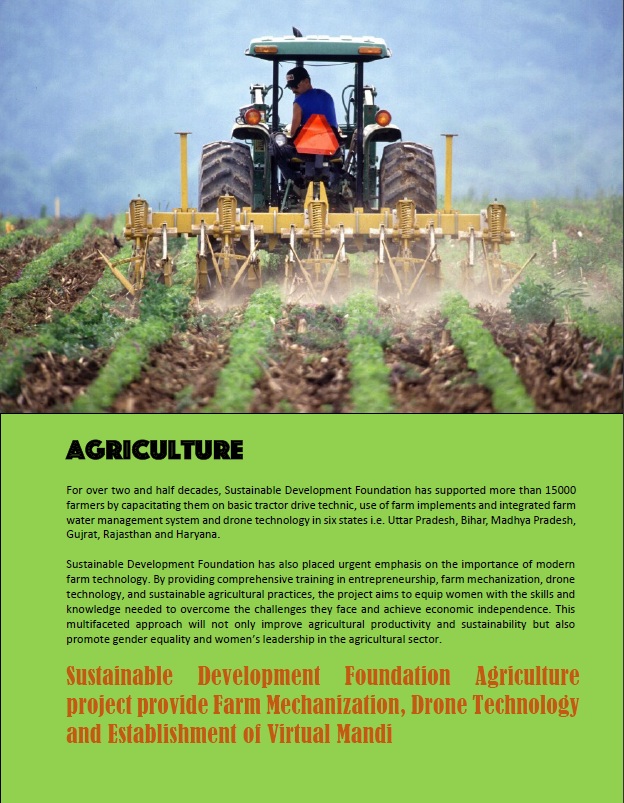
Agriculture Program
Farm to Future: Modern Farm School in Goa
SDF has established a state-of-the-art farm school on 10 acres of land in Goa, dedicated to training women farmers in sustainable and diversified agriculture. The school integrates drone technology, modern farming implements, and hands-on practical training. With two-month-long sessions, it supports 600 women farmers annually, equipping them with advanced farming techniques and fostering entrepreneurial spirit.Sustainable Agriculture and Water Management
SDF's agriculture programs emphasize water management and resource conservation. Training sessions cover techniques such as drip irrigation, rainwater harvesting, and crop rotation to optimize productivity while conserving natural resources. These initiatives have empowered farmers to adopt eco-friendly farming practices that are resilient to climate change.Agro-Tech for Smallholder Farmers
This project leverages technology to modernize farming for smallholder farmers. SDF introduced drone-based crop monitoring, soil health testing, and mobile applications for precision farming. These innovations have enabled farmers to make data-driven decisions, resulting in increased productivity and reduced costs.Farmer Training Programs
SDF organizes capacity-building programs to train farmers in modern and sustainable agricultural practices. Topics include tractor operation and maintenance, diverse cropping techniques, and post-harvest management. These programs have empowered over 8,000 farmers to enhance their productivity and income.Promotion of Organic Farming
To reduce dependency on chemical fertilizers and pesticides, SDF has introduced organic farming techniques to rural communities. The project includes training on composting, natural pest control, and certification processes for organic produce, helping farmers access premium markets for their products.Cage Fish Farming in Hirakud, Odisha
SDF has implemented a cage fish farming initiative benefiting 1,000 fisherman families in Hirakud, Odisha. By providing modern machinery, training, and digitization support, this project enhances livelihoods and ensures sustainable fish farming practices.ITI Student Training in Agricultural Mechanization
SDF has collaborated with Industrial Training Institutes (ITIs) to train students in the operation and maintenance of farm machinery, including tractors and modern implements. This initiative bridges the skill gap in the agricultural sector and increases employability among rural youth.Sustainable Livelihoods for Ultra-Poor Women through Producer Organizations
Covering 3,000 ultra-poor tribal women, this project establishes technology-driven producer organizations to facilitate market access and fair pricing. Participants receive training in agriculture, rural mart management, and entrepreneurship, ensuring an income of ?6,500-?10,000 per month.Promotion of Pulses and Millet Cultivation
SDF is promoting pulses and millet cultivation as climate-resilient crops that provide high nutritional value. The program includes awareness campaigns, supply of high-quality seeds, and technical training to improve yield and market access for farmers.Renewable Energy Integration in Agriculture
SDF supports renewable energy adoption by installing solar-powered irrigation pumps and cold storage facilities in rural areas. This initiative reduces energy costs, minimizes post-harvest losses, and ensures environmental sustainability.Skill Development in Post-Harvest Technologies
SDF provides training in post-harvest management, including processing, packaging, and value addition. Farmers learn to use modern equipment to reduce losses and enhance the marketability of their produce, increasing their incomes.Community Seed Banks and Input Distribution
SDF has established community seed banks to ensure access to high-quality seeds and other agricultural inputs. This project promotes seed sovereignty and reduces farmers’ dependency on external suppliers, fostering self-reliance.